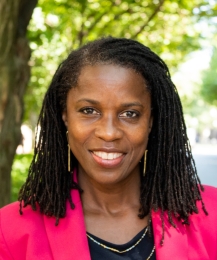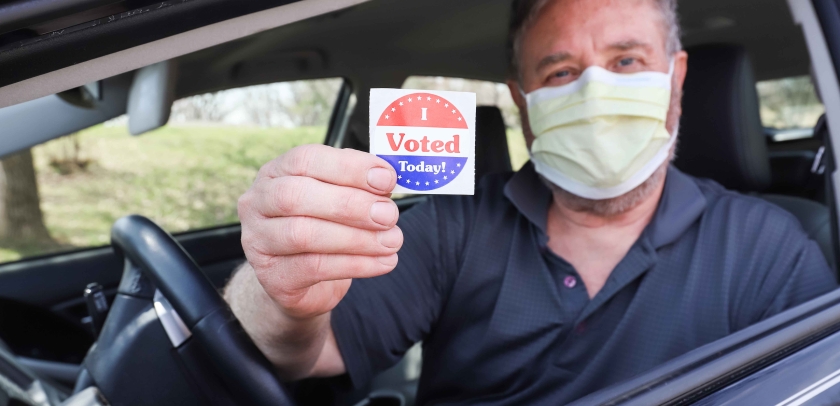How to Mobilize Voters in a Pandemic
Swapping door-knocking for digital outreach has an unexpected benefit, voting rights advocates said at a Columbia World Projects webinar held two days after Georgia’s messy primary election.
Social distancing requirements due to the COVID-19 pandemic have forced voting rights groups to go online rather than door to door in their efforts to register voters. But two leading advocates said that the focus on digital outreach has given the groups greater ability to fight online disinformation campaigns aimed at low-income voters and voters of color.
In an online discussion on June 11, Nsé Ufot, executive director of The New Georgia Project, and María Teresa Kumar, president and CEO of Voto Latino, outlined their strategies for registering voters in 2020 despite the constraints due to the pandemic. The panel was sponsored by Columbia World Projects as part of its Democratic Renewal project and moderated by Olatunde Johnson, Jerome B. Sherman Professor of Law at Columbia Law School.
The pandemic and widespread protests over police violence and systemic racism have created further challenges for turning out low-income voters and voters of color, who “have long been ignored in traditional voter mobilization efforts,” Johnson said. In addition, “ongoing and well-planned efforts” to suppress the votes of those groups have increased since the 2013 Shelby County v. Holder Supreme Court decision ended federal review of election rules in some states—a core provision of the Voting Rights Act of 1965. “All of these developments really make plain for us the stakes of participation in elections, but they really raise the challenges,” she said.
Ufot said The New Georgia Project had planned to engage 1 million voters face-to-face through a door-knocking campaign, but social distancing requirements have meant that “those conversations have transitioned to text and phone. We’ve really stepped up our digital engagement.”
To do so, Voto Latino and The New Georgia Project launched apps for voters to find polling locations and get information about candidates. Ufot said her organization also developed video games to educate young people about “how campaigns and elections work. We don’t plan to leave any tool off the table in our work to build a new Georgia. But it all started with voter registration.”
“The pandemic is being used as cover for more voter suppression.” —Nsé Ufot, The New Georgia Project, in the New York Times
One unexpected benefit of the group’s online presence is that they have gained greater awareness of misinformation spread online about voting during the COVID-19 pandemic. “I don’t know if we would have gotten so sophisticated and so successful so quickly if we were out knocking on doors,” Ufot said. “Because we are meeting our base online, we’ve also been able to monitor disinformation that is targeted at Black voters, and we have deepened our understanding of how to combat disinformation and how to elevate the voices of trusted messengers.”
Kumar said that nearly half of Americans have already been exposed to misinformation online about the pandemic and that efforts to suppress voters of color and non–English speaking voters, similar to those in 2016 and 2018, are occurring again. Organizations such as The New Georgia Project and Voto Latino, Kumar said, “can go to the local level and have that listening arm and be able to combat it.” Voter mobilization efforts will make a difference by “rooting out” disinformation campaigns that disproportionately target vulnerable communities, Kumar said. “They want us to stay home. And that is a form of suppression.”
The discussion took place just two days after Georgia’s troubled primary election where a reduction in the number of polling locations, as well as problems with voting equipment, meant some voters waited in line for as long as seven hours to cast ballots. In addition, thousands of voters who requested absentee ballots did not receive them in time to vote.
“We have no reason to doubt that this can happen in any other state as we head toward” the general election, Ufot said. “We are going to have to have overwhelming participation in our elections in November in order to make sure that the will of the people is reflected in the results.”

